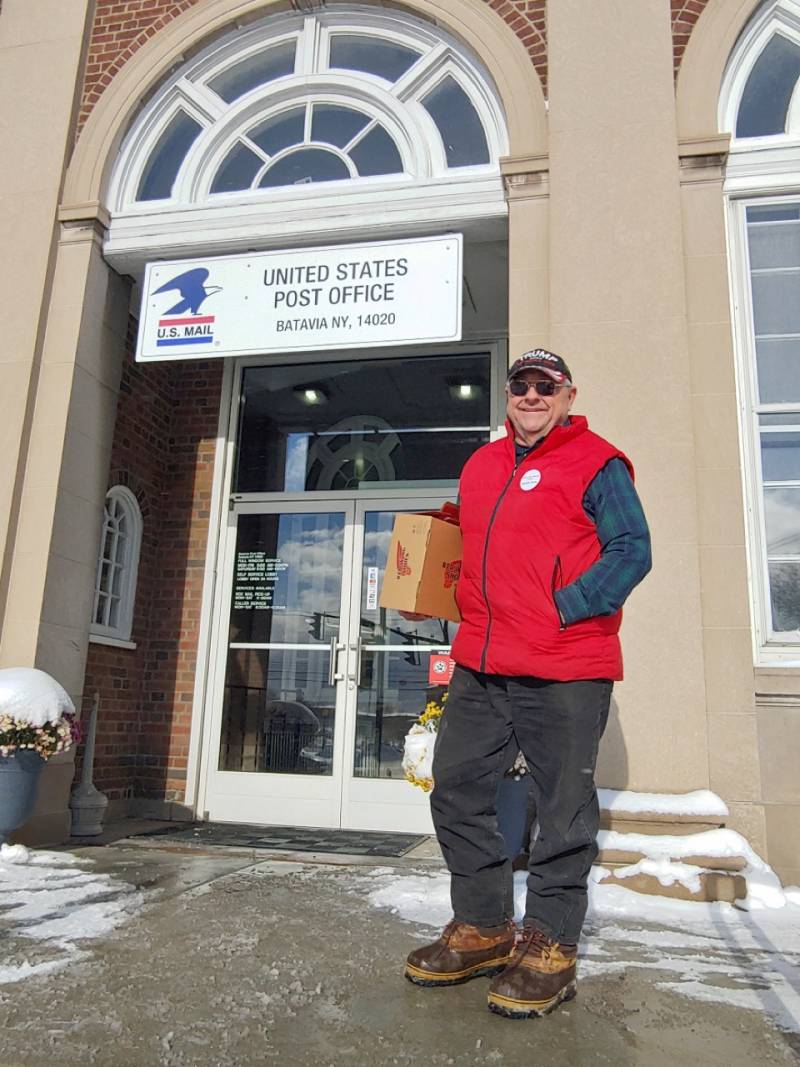
Submitted Photo
While members of Ascension Parish attend the remaining noon mass on Sundays, they are clinging to an appeal process that has reached the second phase in steadfast efforts to fight the Buffalo Catholic Diocese’s attempts to permanently close the doors of Sacred Heart Church in Batavia.
The group Friends of Ascension has been working to keep members informed, signing petition mandates, contributing through participation and financial support, and not letting the light die out at their south side parish.
Longtime member Nancy Brach sent out an email this week providing an update to all.
“Thanks to everyone who has assisted us in this process. This includes our core group, parishioners, those who signed mandates, who attended events and masses, who wrote letters, who volunteered, who proudly wore their buttons, who provided information for our appeal, who publicized the challenges we are facing and who encouraged and supported us in this effort,” she said. “While our main focus is keeping our church open, there is much more to this fight. It is about how the Diocese, and Dioceses across the country, are treating their parishes. And we are not so unaware that we do not realize that some churches should close, whether because of their physical condition, their financial viability or their underutilization.
“But to close healthy churches that are needed, cared for and loved in their communities is another story,” she said. “It is clear that individual parishes are being closed due to the transgressions of the Diocese.”
She referred to a “Buffalo News” article quoting attorney Ilan Scharf about the Diocese, defendants in sex abuse lawsuits that have their own assets, including cash investments, and real estate, that should be considered in any settlement discussions.
“If the diocese is going to survive as an entity, other parishes, even those without claims directly against them, can make a contribution to help fund a settlement,” Scharf said. “It’s been done in every other settlement across the country.”
While this may be legally correct, it is ethically wrong to punish people for the sins of others, Brach said.
“It is obvious that she is just looking for a bigger pot to divide among the legal team and those she is representing,” Brach said. “But she intends to take the money from people who are not responsible for the crimes. That is wrong.
“We hope we will be successful in our appeal,” she said. “But it is also important that we can serve as an example of standing up for what is right and that we can encourage other parishes to fight back, instead of giving up.”
Liz Zilbauer of Save Our Buffalo Churches posted to that article and also emailed the Ascension group her thoughts about the situation with the Diocese and notion that other parishes can help to pay for these ongoing sex abuse lawsuits.
“Claimant attorney Ilan Scharf is quoted as explaining Canon Law allowing for 'the assets of merged or suppressed parishes to be used elsewhere within the diocese.' What? Used elsewhere? Actually, with each parish, a separately incorporated entity, the sale money and assets of a parish belong to that parish unless and until that parish is (legitimately) extinguished and its property sold,” Zilbauer said. “Then that money can go to the bishop, but only under certain circumstances, and when legitimate grave cause justifies the closure."
Zilbauer concluded that there is no grave or just cause in the great majority of these closures or that a grave cause could actually have "been accurately determined by the process inflicted on us.”
She included an excerpt from an appeal letter to the dicastery that a canon lawyer encourages parishes to send. It "really sets the record straight" regarding "what is legitimate here and what is not," she said.
“In his decree for [name of] Parish, Bishop Fisher notes the need to amass a substantial sum of money to settle numerous civil claims in Federal Bankruptcy Court, and that the possibility of alienating [parish's] properties has been suggested,” she said. “We strongly object to the potential of our longstanding parish community being sacrificed to satisfy the temporal and pecuniary obligations of the diocese for civil claims that are unrelated to the actions and activities of our parish community. We have informed the Bishop of this objection within our appeal letter.
“I think we diocesan parishioners need to be vigilant against the loopholes ripe for exploitation suggested by ‘net assets’ especially considering it seems to have been the plan all along to use the settlements as pretext for a mass-reduction of footprint … continuing to threaten the parishes, and in fact, deepening the threat, when they have less and less rational/practical justification for doing so,” she said. "Ironically, this is happening during the Christmas season and at the door of the 2025 Jubilee Year — which is defined, in part, by a forgiveness of all debts. It will be during this year that the diocese doubles down on the collection of debts we neither owe nor they have any right to take.”
This second step of an appeal went to the Holy See, which has 90 days to respond. If Ascension receives a denial or no response, it can appeal to the Church's Supreme Court, the Apostolic Signatura, which follows its own regulations “in a different process that requires appellants to hire an advocate in Rome approved by the Signatura.”
There is no strict timeline or constraint for the response, and the Signatura may give extensions during this process.
For previous story about the process and remaining church mass, go HERE.
